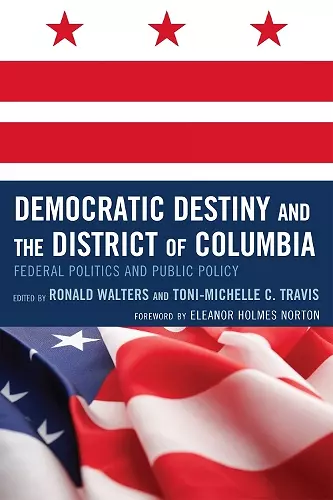Democratic Destiny and the District of Columbia
Federal Politics and Public Policy
Ronald W Walters editor Toni-Michelle Travis editor
Format:Hardback
Publisher:Lexington Books
Published:8th Mar '10
Currently unavailable, and unfortunately no date known when it will be back
This hardback is available in another edition too:
- Paperback£45.00(9780739127179)

This critical examination of Washington, D.C.'s mayors and public policies reveals the complexities of local governance and the ongoing fight for true representation, as discussed in Democratic Destiny and the District of Columbia.
This volume offers a critical examination of the mayors of Washington, D.C. since 1968, alongside an analysis of the public policies that have shaped the city since Congress granted limited Home Rule. It provides insights into the complex political landscape of Washington, D.C., making it relevant to scholars and practitioners in political science, urban studies, and public policy. By addressing the unique challenges faced by the city, the book contributes significantly to the literature on urban affairs and public policy.
Democratic Destiny and the District of Columbia delves into the intricate relationship between the federal government and the District, illustrating how this dynamic affects the ongoing struggle for congressional representation, genuine home rule, and equitable federal benefits for D.C. residents. The text highlights how the city's distinctiveness influences the political climate, particularly for mayors who often find their roles limited to local affairs, without the opportunity to ascend to higher political office. The book examines the implications of this unique situation for political leadership and governance.
A key objective of this volume is to illuminate the challenges of achieving political democracy and fair policy distribution for the citizens of Washington, D.C. Through its analyses, the book concludes that the original construction of home rule remains a significant barrier to these goals, ultimately supporting the notion that the aspirations of D.C. residents for change are valid and necessary.
The struggle for full democratic self-government and for full congressional voting rights in the House continues unabated… These authors take a fresh look at how the first elected officials to govern the District of Columbia defined self-government for the city amidst the problems and dilemmas they found. The nation should be grateful to these authors for what their insights tell us about government in the modern nation's capital and, inadvertently, about the nature of governing in the nation itself. -- Del. Eleanor Holmes Norton, Delegate of the District of Columbia, from the foreword
This volume is very timely as it offers the reader a case study of the struggle for full democracy in the Nation's capital at a time when the United States is actively seeking to establish and promote democracy internationally. This volume offers important insights into the successes and failures of executive leadership in the District of Columbia thereby providing students of political science and governance a wealth of case materials not previously available. Most important, this volume show cases the political conflicts in the city's struggle to achieve control over its governance and to achieve local representation for its residents. -- Stephen S. Fuller, Director, Center for Regional Analysis, George Mason University
The Declaration of Independence asserts that governments derive their just powers from the consent of the governed, but American citizens who live in the District of Columbia see their elected local government overruled by a Congress in which they have no voting representative. This impressive anthology explains why the District achieved only limited home rule in 1973, and how this anomalous form of local government has shaped a wide range of public policies ever since. -- Zachary M. Schrag, author of The Great Society Subway: A History of the Washington Metro
The essays contained in this volume are at once timely and revealing. They explain in penetrating detail why Washington D. C. is often referred to as the "last colony." Using a combination of case studies and probing policy analysis, this volume shatters the myth that city governance in Washington is impossible without the intervention of the heavy hand of the federal government. The contributors to this volume demonstrate convincingly that as long as racism is an omnipresent and highly institutionalized factor in the administration of city affairs in Washington, the absence of home rule and self government in the nation's capital will continue to resound as a problem in democracy for the United States as a whole. This volume is long overdue. It should be essential reading for every federal official and local politician involved in the shaping of the city's future. -- William E. Nelson, Ohio State University
Every American has a responsibility to understand the unique challenges facing our federal capital—particularly because the citizens of Washington, D.C. do not have their own fully empowered representation in Congress. Respected scholars Ronald Walters and Toni-Michelle Travis have assembled a superb group of contributors who present us with the unvarnished truth about D.C. And the truth is the first step to solving some of the intractable problems that plague both the District and the entire nation. -- Larry J. Sabato, director, University of Virginia Center for Politics and author of The Kenneday Half-Century
ISBN: 9780739127162
Dimensions: 241mm x 161mm x 25mm
Weight: 576g
292 pages